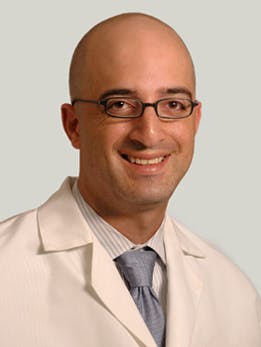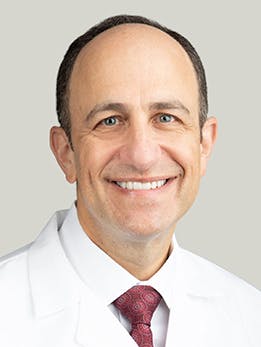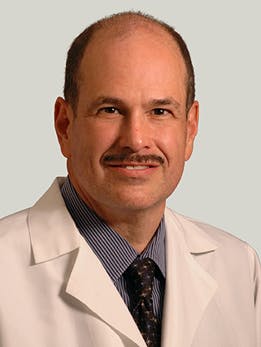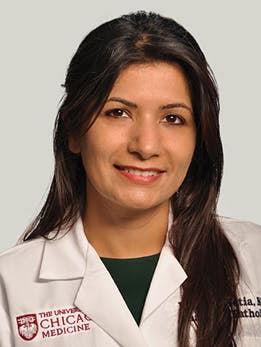Clostridioides difficile (C. diff) Infection
What is Clostridioides difficile infection?
Clostridioides difficile infection (CDI) is a bacterial infection of the colon caused by a bacterium called Clostridioides difficile and commonly referred to as "C. diff" or C. difficile.
C. difficile infection is a leading cause of healthcare-associated infection with over 400,000 cases diagnosed annually in the United States and is increasingly recognized in the community setting.
Clostridioides difficile most commonly causes diarrhea in individuals that have recently been exposed to antibiotics. Due to disruptions in the normal and healthy bacteria of the colon, C. difficile can germinate and begin to produce toxins that injure the surface of the colon resulting in diarrhea. In addition to prior antibiotic exposures, risk factors such as recent hospitalization, underlying inflammatory bowel disease or contact with individuals recently treated for C. difficile are risk factors for the development of C. difficile infection.
What are Clostridioides difficile symptoms?
Symptoms can range from changes in the form, frequency and consistency of stool to rare cases of life-threatening toxic megacolon that requires hospitalization and sometimes surgery. Abdominal discomfort, fevers and weight loss can be seen in C. difficile infection, but are not always present. With severe infection, C. difficile commonly produces elevations in the white blood cell count and blood markers of inflammation.
How is Clostridioides difficile transmitted?
Clostridioides difficile is a ubiquitous bacteria present at times on household surfaces, foods (particularly meats) and most commonly in healthcare settings. Bacterial spores which can be resistant to standard household cleaners can survive on surfaces for prolonged periods of time and enter the digestive system when people touch contaminated surfaces with their hands and then touch their mouths.
Exposure to the bacterial spores most often also has to occur in the setting of a disturbed microbiome (intestinal bacteria in the colon), which occurs with antibiotic use. When antibiotics remove the beneficial bacteria in the colon, C. difficile can grow and becomes capable of producing toxins that result in diarrhea.
How is Clostridioides difficile diagnosed?
As C. difficile can produce toxins that result in colon injury and diarrhea, diagnosis is made through DNA-based testing for the presence of toxin and/or through protein-based testing detecting the toxin in the stool of individuals with diarrhea.
Imaging techniques such as computed tomography (CT) scans and X-rays of the abdomen can assess for thickening of the colon and dilation of the colon in the setting of severe infection. Additionally, colonoscopy can be performed to assess for alternative conditions predisposing to C. difficile such as inflammatory bowel disease.
How serious is Clostridioides difficile infection?
Clostridioides difficile can result in severe illness. As a healthcare-associated infection, C. difficile can complicate the management of underlying health disorders such as cancer therapy, organ transplantation or inflammatory bowel disease. In rare cases, C. difficile can result in toxic megacolon or a severe inflammation of the colon requiring advanced therapies and/or surgery for removal of the colon.
One of the most problematic features of C. difficile infection is the development of recurrent disease 2-8 weeks after initial treatment of the infection with oral antibiotics. Multiply recurrent cases can occur due to disruptions in the normal microbiome of the intestines as well as the long-standing spore-forming nature of the bacteria. These recurrent infections are less susceptible to treatment with standard antibiotic courses and often benefit from microbiome based therapies or immune regulatory therapies for management.
How is Clostridioides difficile treated?
Following diagnosis, C. difficile infection is most commonly and effectively treated with oral antibiotics. As the bacteria can survive for long periods on household surfaces as a spore, repeated infections after treatment are common. Approximately 20-40% of individuals develop recurrent C. difficile infection due to underlying disruptions of the normal and healthy bacteria that live in the colon (the microbiome). Novel techniques and now advanced medical therapies are focused on improving and normalizing the microbiome to reduce the risk of repeatedly recurrent infections.
Gastroenterologists at the University of Chicago Medicine have been performing fecal microbiota transplantation (FMT) since 2016 for recurrent C. difficile infection in which healthy bacteria from donor stool is implanted into the digestive tract, most commonly during a colonoscopy procedure. The introduction of healthy bacteria into the colon outcompetes the pathogenic C. difficile allowing for the most effective management of recurrent C. difficile infection. Novel microbiome based therapies and antibodies against the C. difficile toxin are also increasingly available to reduce the risk of recurrent disease.
Dedicated Treatment and Novel Therapies for C. Diff at UChicago Medicine
Physicians at the University of Chicago Medicine have created a unique multidisciplinary team composed of gastroenterologists, infectious disease specialists and pathologists with a longstanding and diverse interest in the management of C. difficile infection. This allows for the creation of dedicated treatment pathways offering a wide variety of therapies both for primary infection and recurrent disease. In addition to the use of FMT since 2016, the physicians at the UChicago Medicine have unique experiences and insight into the use of novel therapies aimed at reducing the risk of recurring disease. The longstanding strengths in understanding microbiome-based therapies also allows us to share with patients active clinical trials for the management of C. difficile infection.








